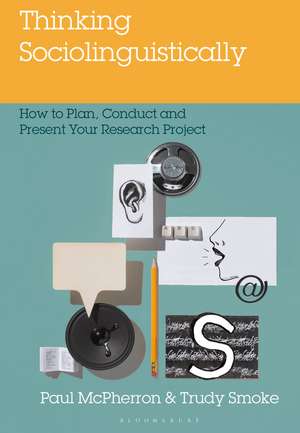Thinking Sociolinguistically: How to Plan, Conduct and Present Your Research Project
Autor Paul McPherron, Trudy Smokeen Limba Engleză Paperback – 13 noi 2018
Preț: 198.22 lei
Preț vechi: 243.99 lei
-19% Nou
Puncte Express: 297
Preț estimativ în valută:
37.93€ • 39.74$ • 31.36£
37.93€ • 39.74$ • 31.36£
Carte tipărită la comandă
Livrare economică 11-25 aprilie
Preluare comenzi: 021 569.72.76
Specificații
ISBN-13: 9781137605979
ISBN-10: 1137605979
Pagini: 244
Dimensiuni: 155 x 235 x 22 mm
Greutate: 0.36 kg
Ediția:1st ed. 2019
Editura: Bloomsbury Publishing
Colecția Bloomsbury Academic
Locul publicării:London, United Kingdom
ISBN-10: 1137605979
Pagini: 244
Dimensiuni: 155 x 235 x 22 mm
Greutate: 0.36 kg
Ediția:1st ed. 2019
Editura: Bloomsbury Publishing
Colecția Bloomsbury Academic
Locul publicării:London, United Kingdom
Caracteristici
Contains international examples of research which address a variety of languages and research contexts alongside suggestions for further reading
Notă biografică
Paul McPherron and Trudy Smoke are based at Hunter College, which is part of the larger City University of New York system. They have taught sociolinguistics for many years, and the book has been inspired by their experiences of guiding their own students through the research process.
Cuprins
Introduction Part One: Thinking Sociolinguistically 1. What is Sociolinguistics Research? 2. Getting Started with a Sociolinguistic Research Project Part Two: Data Collection Methods in Sociolinguistics 3. Survey Data 4. Interviews 5. Participant Observation 6. Linguistic Landscape and Computer-mediated Data Sources Part Three: Data Analysis Methods in Sociolinguistics 7. Qualitative Data Analysis 8. Discourse Analysis 9. Statistical Analysis 10. Corpus Data Analysis Part Four: Putting it all Together and Finding Your Voice 11. Organizing Your Research Paper 12. Sounding Like a Sociolinguist Glossary References Index.
Recenzii
Thinking Sociolinguistically provides a clear and accessible guide to researching language in society. This book will encourage readers to think about their own experiences with language and the social world and to question their assumptions. Chapters feature colourful examples and exercises help to get the creative juices flowing.
With its unique blend of practical step-by-step guides, homage to the works of established linguists, and candid insights into the messiness of social science research, I predict this volume will fast become a go-to primer for (future) applied linguists.
This is a most engaging guide for students embarking on sociolinguistic projects large or small. Its discussion of different approaches, sample topics, and the tips on presentation of research and writing style will be invaluable to readers.
As a teacher, it's easy to fall into the trap of thinking that your students will inductively figure out how research works simply by reading a lot of published articles, but having the mechanics of a project explicitly pointed out is an important but often overlooked part of that learning process . This book provides enough scaffolding that students can start to experiment with small projects, and figure out not only how research works, but also how they work as researchers.
With its unique blend of practical step-by-step guides, homage to the works of established linguists, and candid insights into the messiness of social science research, I predict this volume will fast become a go-to primer for (future) applied linguists.
This is a most engaging guide for students embarking on sociolinguistic projects large or small. Its discussion of different approaches, sample topics, and the tips on presentation of research and writing style will be invaluable to readers.
As a teacher, it's easy to fall into the trap of thinking that your students will inductively figure out how research works simply by reading a lot of published articles, but having the mechanics of a project explicitly pointed out is an important but often overlooked part of that learning process . This book provides enough scaffolding that students can start to experiment with small projects, and figure out not only how research works, but also how they work as researchers.
